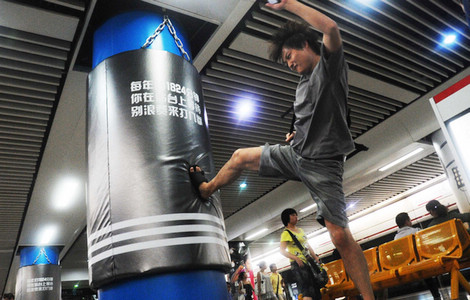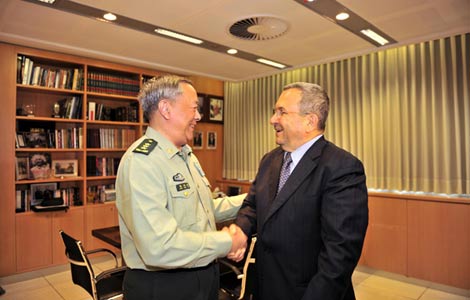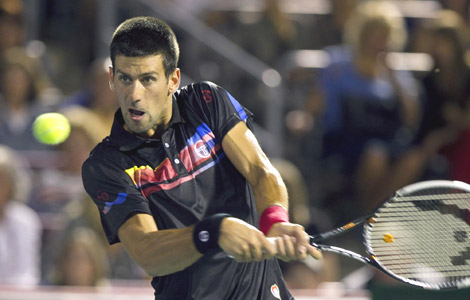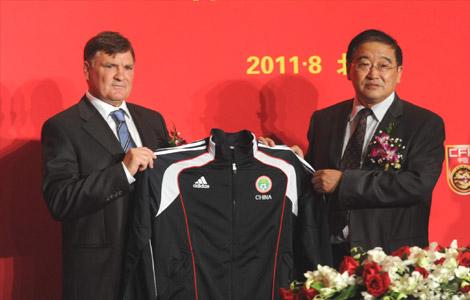Camacho, a symbol of launching pad for Chinese football
Updated: 2011-08-15 09:52
(Xinhua)
|
|||||||||||
BEIJING - After years of miserable international performences and internal chaos, the Chinese football community is ready to make a change. And the appointment of Jose Antonio Camacho as coach of the national team is a symbol of the change.
The 55-year-old Camacho signed a three-year contract with the Chinese Football Association (CFA) here on Sunday. Though with just three weeks ahead of China's World Cup qualifying match against Singapore on September 2, the Spaniard does not need to worry about the limited time, as he is facing a different CFA, which is more patient and keen to learn.
The former Spain and Real Madrid boss is the seventh foreign coach hired to steer the Chinese men's senior side, which always draws wide public attention throughout the country.
However, Camacho is luckier than any of his six predecessors, because this time the CFA is looking for a teacher to learn from rather than a baby-sitter who was only envisioned to lead the team for a given mission and would take the main blame once the mission failed.
"Appointing Camacho is part of our long-term revival plan," said Yu Hongchen, vice director of the Chinese Soccer Administrative Center. "The qualifying stage of 2014 World Cup is just a temporary task for him. Even if the task is failed, he will not lose the job."
Wei Di, head of CFA, agreed with Yu, as he believes Chinese football has wasted too much time in pursuit of instant success.
"A lot of our fans expect China to qualify for the 2014 World Cup finals in Brazil. They are afraid that changing the coach at the last moment may cause bad effect to the team's qualifying prospect. I can totally understand that. But we do not have any time to waste," said Wei.
The change of attitude towards foreign coaches reflects the change of conceptions within China's football, which has been marred by corruption, crooked referees, and match-fixing scandals and threatened by an ever-shrinking talent pool in recent years.
China's troubled Super League kicked off on April 1 without a title sponsor or a national TV deal, and with senior officials still facing trial over a corruption scandal.
Former Chinese soccer chief Nan Yong was arrested in January 2010 along with other association officials after a cabinet-level investigation into bribery, match-fixing and illegal gambling in the sport.
Also arrested and facing trial are Nan's predecessor Xie Yalong, and scores of other leading club and association officials and referees.
Wei has expressed in different occasions that the Chinese football community needs a long-term revival plan to lift the credit of the sport as well as the performances of the national sides. With the arrival of Camacho, such plan is underway.
"When we started to find a new coach for the national team, we mainly focus on European countries such as Germany, the Netherlands and Spain," said Yu Hongchen. "First of all, they have advanced football concepts, and secondly they have a productive youth training system, which we can learn from."
It has been a consensus that establishing a talent training system is the priority for the development of Chinese football. The CFA has already launched the "Future Star Program" that will send 20 young players every year to Spain, Portugal and the Netherlands. And helping to complete the youth training system is another important task for Camacho during his spell in China.
During the past decades, Chinese football has learned from coaches of Germany, England, the Netherlands and Serbia, but still lacked a settled playing style or formation to follow. The CFA also expects Camacho can help to forge China's own style.
"After a year's careful estimating and selecting, we finally chose Camacho as our new coach. We hope he can help us to find a suitable style," said Yu.
According to Yu, Camacho will not only focus on the senior team, but also help integrate the playing style of Chinese national teams at all age levels.
"Compared with our neighbors Japan and South Korea, Chinese football is lagging far behind. We need to work with a long-term view and start to catch up with a pragmatic approach," said a determined Wei.
- Norway attacker back on crime island
- Courts get property disputes guidance
- Boy accuses stepmom of head injury
- Population figure faked for more funds
- Govt to monitor disposal of unsafe, outdated food
- Carrier returns to Dalian after maiden sea trial
- Warning that new tick disease is highly infectious
- Locke reassures China on dollar assets
Hot Topics
Anti-Gay, Giant Panda, Subway, High Speed Train, Coal Mine, High Temperature, Rainstorm, Sino-US, Oil Spill, Zhu Min
Editor's Picks

|

|

|

|

|

|







